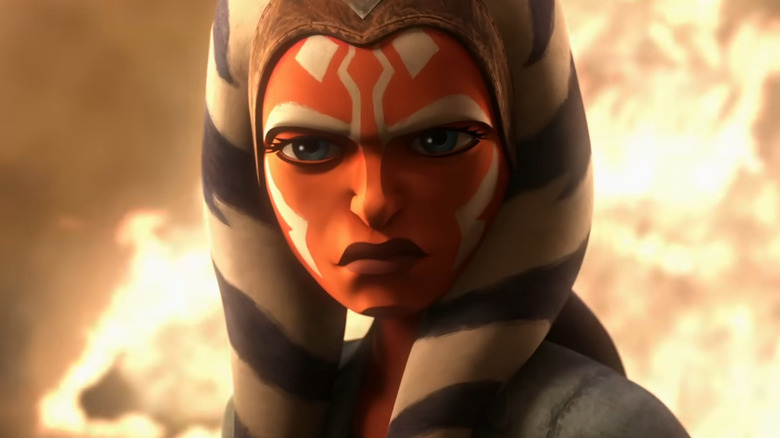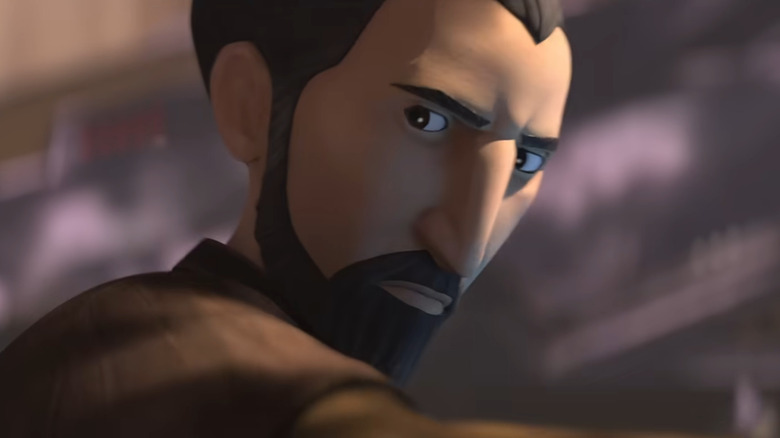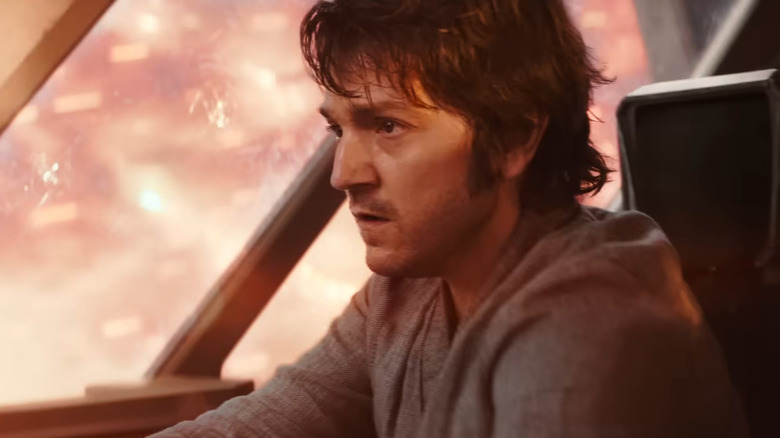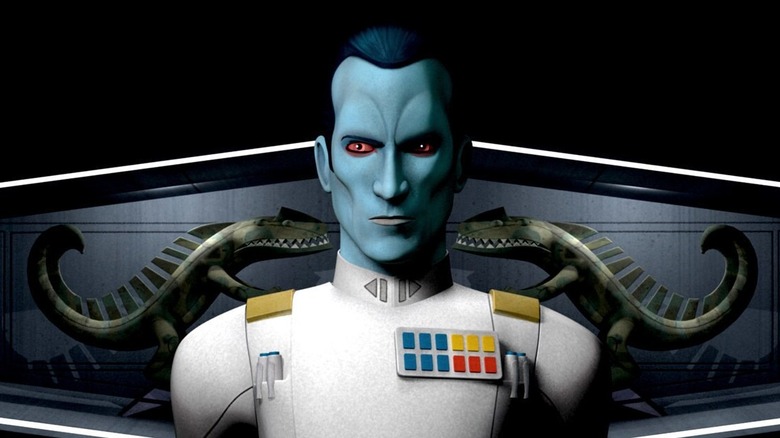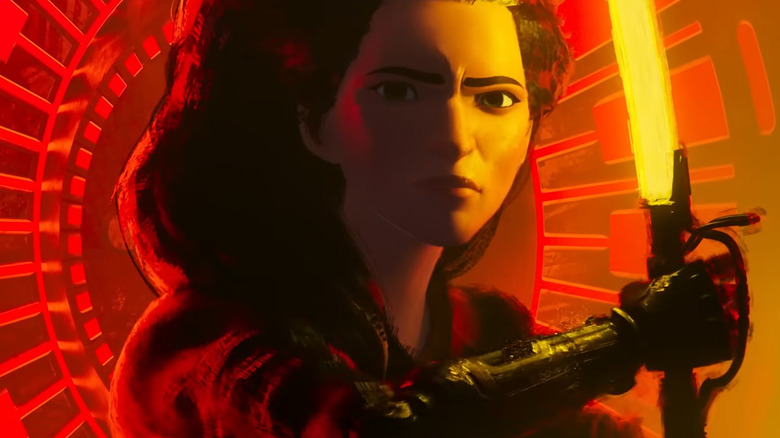Star Wars Canon Is Already Meaningless, And That's A Good Thing
When George Lucas sold "Star Wars" to Disney back in 2012, the new owners declared big changes for the series' expansive canon. The myriad novels, video games, and spin-off comics that made up the old "Expanded Universe" were pushed to the side and relegated to a new, non-canon timeline called "Star Wars" Legends. This paved the way for Disney to establish its own official order of events without having to grapple with hundreds of side projects.
Though many longtime fans mourned the loss of these beloved stories, the plan made a certain amount of sense. In the two decades between the release of "Heir to the Empire" and the Disney acquisition, Lucasfilm released a staggering amount of supplementary material covering thousands of years of galactic history. There were dark Force clones, Clive Barker-esque alien invaders, and more Sith ghosts than you could count. Luke Skywalker got married and cloned, and Chewbacca got killed by the moon. All told, the Legends timeline is a hodgepodge, and it would have been difficult for Disney to bring all of it together in a cohesive way.
But now we're a decade into the great Disney "Star Wars" experiment, and the new canon the company established back in 2012 is already meaningless. Thanks to the same old brand of retconning and a lack of creative consistency, the official timeline has become just as confusing as the Expanded Universe was. And strangely enough, in the long-term, that may be exactly what "Star Wars" needs.
The Disney Star Wars canon has started to contradict itself
Ostensibly, the whole point of Disney wiping the "Star Wars" canon clean (save for George Lucas' six films and "The Clone Wars") was to make things simpler. The Expanded Universe had too many stories from too many writers and not enough oversight. Or at least, that was the guiding idea. But now, 10 years in, Disney has fallen victim to the same dilemma.
Take "Tales of the Jedi," a short-form Disney+ spin-off to "The Clone Wars" helmed by animated "Star Wars" maestro Dave Filoni. It's a gorgeous series that fills in gaps for both Ahsoka Tano and Count Dooku, tracing their similar but opposite paths. Ahsoka's episodes detail how she came to join Bail Organa's rebellion after going into hiding in the wake of Order 66. Dooku's explain that he was still a practicing Jedi during the events of "The Phantom Menace."
That's all well and good, except for the fact that both stories directly contradict canon Disney novels. The 2019 audiobook "Dooku: Jedi Lost" claims that Dooku left the order years earlier, and the 2016 novel "Ahsoka" tells a notably different version of the titular protagonist's path to the Rebellion. These inaccuracies could be read simply as different versions of the same stories, which is fine, but it also defeats the entire point of demarcating canon in the first place. Even in the Disney era, it's clear that written texts don't hold as much water as movies and shows.
Lots of Star Wars stories just don't make sense together
Beyond the franchise's overt retconning of canon material, "Star Wars" is kind of a mess tonally. When you compare two shows like "Rebels" and "Andor," which both take place at the same point in the timeline and both cover the early days of the Rebel Alliance, it can occasionally feel like they exist in different universes. In the former, the Empire is an evil but cartoonish (literally) regime that (almost) always manages to let the heroes slip away. In the latter, the different aspects of fascist rule are broken down and analyzed in detail, creating a truly terrifying picture of what life under empire looks like.
The reason for that difference is obvious: "Rebels" is a cartoon for kids, and "Andor" is decidedly not that. Both can coexist in the same canon simply because they take place in different corners of the galaxy, which can be used as an explanation for why the severity of things is so different in each. But even still, there's no question that the two shows feel inconsistent with each other when you look closely.
And that's fine! "Star Wars" has always been for kids. It will never, ever not be for kids. But with Disney now trying hard to diversify the kind of content in the franchise, we also get stories that are for different audiences. That variety is one of the series' strengths, but it still makes the strictness of canon feel a bit less important.
The modern Star Wars canon keeps going back to the Expanded Universe
Perhaps the most bizarre and, honestly, funny conundrum of the Disney "Star Wars" canon is that, more often than not, it's taken its biggest ideas from the old Expanded Universe. Palpatine cloning himself, a secret shadow empire, Grand Admiral Thrawn, dark troopers, a new Jedi Order, the son of Princess Leia and Han Solo turning to the dark side — all of these core storylines are ripped straight from Timothy Zahn's books, or the old "Star Wars" comics, or the Yuuzhan Vong saga, or some video game. For as much energy and time as Disney spent wiping it all from canon, the Legends lore has never actually left the core "Star Wars" franchise.
And, again, that's been a good thing more often than not. There are genuinely great ideas and fantastic characters in the old EU. And by decanonizing it, Lucasfilm has been able to pick and choose what bits to keep. But at the same time, using so many Legends storylines makes it hard for Disney to fully dismiss the old canon. By continuing to pull things out of non-canon texts, the company is subtly encouraging fans to continue engaging with the EU. There are surely people out there who picked up "Heir to the Empire" for the first time after that "Ahsoka" trailer dropped. If we're still telling the same stories over and over again, does it really matter that much what we call canon and what we don't?
Star Wars should ignore the idea of canon entirely
Between the tonal inconsistencies, the overt retconning, and the constant retreading of old EU storylines, Disney's "Star Wars" is far from a shining example of canonical purity. And as the franchise continues to get bigger, that problem is only going to grow. That's why Lucasfilm should toss the idea of canon out entirely and embrace what "Star Wars" has always been: a beautiful, messy hodge-podge with stories of all kinds and for all ages.
There's just too much to keep track of now — too many Disney+ shows, Marvel "Star Wars" comics, canon video games, and spin-off novels. There are too many side characters. There are too many eras. Promising true canon in the face of all that is only going to encourage scrutiny and lead to disappointment among the fans who actually care. For everyone else, the franchise would be more accessible if it dropped the facade of having some grand, overarching timeline.
We've already seen glimpses of what that "Star Wars" could be like — a less serious, more creative universe full of possibilities. "Star Wars: Visions" is one of the most acclaimed projects released under the Disney banner, and none of its anthology episodes are remotely canon. Just imagine the kinds of exciting stories we'd get if the whole franchise took that approach; if "Star Wars" was a universe where everything was kind of true, but where only a select few core stories were irrefutable beyond doubt.
